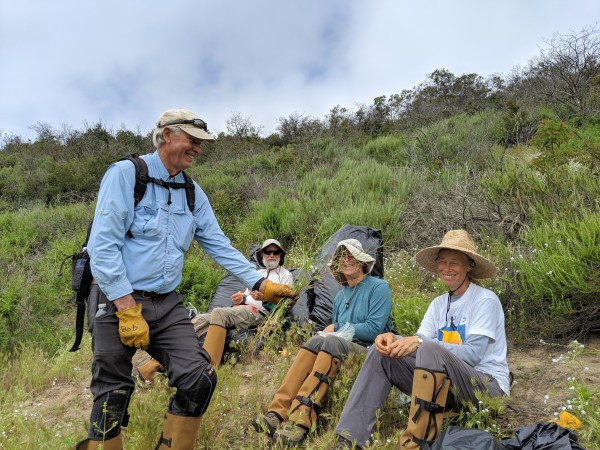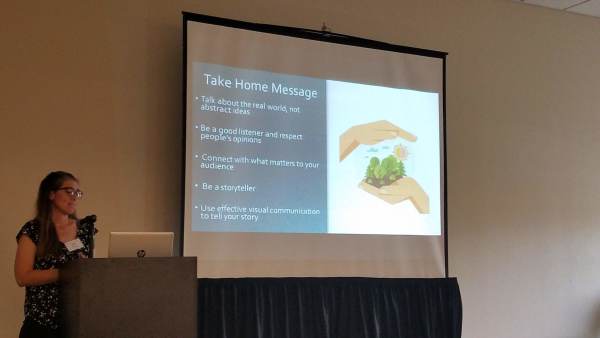Each year, the California Invasive Plant Council (Cal-IPC) holds a symposium where experts and attendees from all around the state come to discuss how best to protect native biodiversity from invasive plants. This year’s symposium held in October, was in Riverside, the birthplace of the California citrus industry. Cal-IPC states: “Weed control has its roots in agriculture and today’s wildland invasive plant management work is a hybrid between this agricultural heritage and modern restoration ecology.”
Formed in 1992, Cal-IPC works closely with agencies, industry and non-profit organizations – like Laguna Canyon Foundation – to address one of California’s top environmental threats: “wildland weeds.” For many of us who consume today’s news, “wildland weeds” may not seem a top threat but, particularly as Californians, it is an important concept. Invasive plants are the second biggest cause of habitat destruction, second only to development. On its website, Cal-IPC defines “wildland weeds” as “plants that evolved in one region of the globe moved by people to another region.” A few of these invasive plants flourish, “…crowding out native vegetation and the wildlife that feed on it. Besides damaging wildlife habitat, these invasive plants can degrade our food and water supply and increase the risk of damage from wildfire and flooding, all of which can cause major economic damage to our state.”
What we can understand from Cal-IPC’s definition is that invasive plants can take over native habitats, develop mono-cultures, deplete native animals’ food sources (as well as our own), create potential flooding and fire danger and cost a lot of money, concerns we all share.With these urgent issues and lofty goals, “Community Engagement,” “Deconstructing the Stories. We Tell about Weeds,” and goat feces were among the symposium topics of particular interest to Laguna Canyon Foundation staff in attendance.
During the symposium’s poster and exhibitor session, Laguna Canyon Foundation’s Restoration Coordinator, Adam Verrell shared efforts to engage volunteers and the community. Laguna Canyon
Foundation has developed an Invasive Plant Patrol Program in which volunteers and community members are trained in “Early Detection Rapid Response,” a program developed by the Orange County Chapter of the California Native Plant Society. Once trained, volunteers participate in monthly surveys on trails deemed a high risk for emergent plants. “Participants don’t have to be an expert in invasive plants, per se,” Adam explained, “they just have to be familiar enough with the trails they frequent to notice something different.” Results of the surveys are uploaded to the OC Parks Weed Manager’s group of Calflora. where experts can collect and analyze data from around the state.

Volunteers are a critical component in protecting California’s wildlands from invasive plants and one of our dedicated volunteers, Joan Miller, was honored as 2019 Wildland Stewardship Volunteer of the Year for her countless hours of mustard management in Laguna Coast Wilderness Park. We are grateful for her commitment.
Invasive plants can be a serious threat during wildfire season, which lately, seems to be all year long. Restoration Program Director, Alan Kaufmann, was particularly interested in Alissa Cope’s “Prescribed Goat Grazing for Wildland Management” presentation.
Partnering with the Laguna Beach Fire Department and other agencies and companies, Alan manages Laguna Canyon Foundation’s fuel modification projects, which include both goat-grazing in more degraded habitat areas and hand crews in high value habitat areas. Ms. Cope discussed her research on the presence of viable seeds within goat fecal pellets. Always finding a balance in costs and effective ways to manage fire safety and sensitive habitat, this research could be helpful in the timing, duration and frequency of grazing as an effective fuel modification tool.

Laguna Canyon Foundation Restoration Manager Josie Bennett, a long-time and active member of Cal-IPC contributed in several areas of the symposium, including co-leading a breakout session on Communication Strategies. “Scientists are not known for their good communication skills. We are data-driven, with a simple and direct communication style,” Josie shared, “but we need to understand that people gather information in different ways, through their brain, gut and heart.” That is why, Josie explained, story-telling and experiential learning is so important and why Josie is committed to leading the way to create hands-on learning opportunities for adults and children alike at Laguna Canyon Foundation’s “Keep it Wild” volunteer events. At the Keep it Wild events, participants learn, for example, how the area around Aliso Creek – the very area in which they would be standing at a Keep it Wild – is really connected to their own backyard through riparian habitat and watershed health. As the participants view coast live oak trees surrounding them at Big Bend, another Keep it Wild location, they learn the superpowers of acorns and how critical that little nut is to the survival of countless native animals.
One of Josie’s favorite quotes is by Mary Oliver: “Instructions for living a life: Pay attention. Be astonished. Tell about it.”
The biologists and ecologists on Laguna Canyon Foundation’s staff are eager to share both the science behind their work and the stories it tells. For more information, or to join us, visit our events page and click on the volunteer box. We hope to see you on the trails soon.
For more information on Cal-IPC, visit their website.
